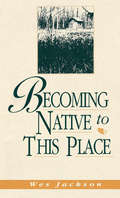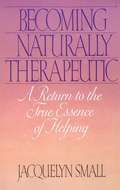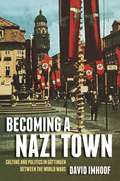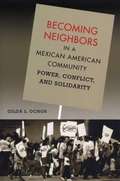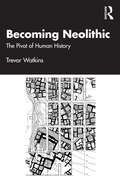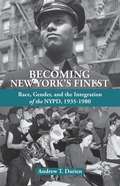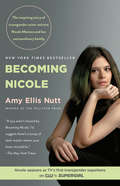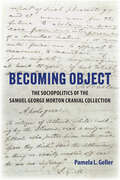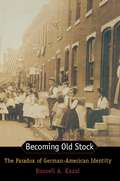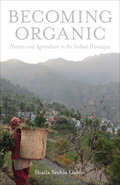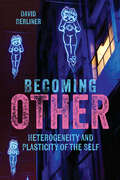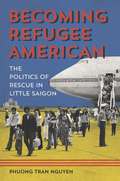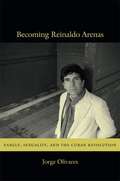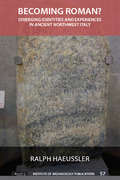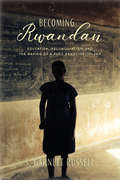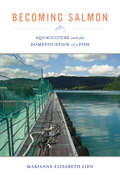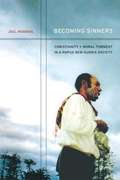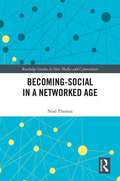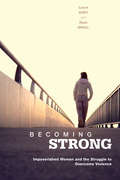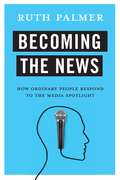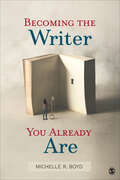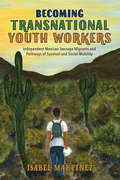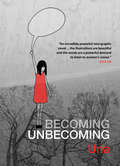- Table View
- List View
Becoming Native to This Place (Blazer Lectures)
by Wes JacksonIn this essay collection, one of the foremost voices in sustainable agriculture sets out a new approach to farming and community engagement.In these six compelling essays, Wes Jackson lays the foundation for a new farming economy grounded in nature's principles and located in dying small towns and rural communities. Exploding the tenets of industrial agriculture, Jackson seeks to integrate food production with nature in a way that sustains both.Jackson’s radical vision is directly at odds with a modern consumer culture that deprives us of any meaningful connection to our natural and social environments. His essays, anchored in his work with The Land Institute, offer an authentic and practical approach to topics that often fail to escape the realm of theory.
Becoming Naturally Therapeutic: A Return to the True Essence of Helping (Revised Edition)
by Jacquelyn SmallAs a classic in the alcohol treatment and counseling communities, here is a life-changing guide for anyone in a therapeutic relationship--whether a professional counselor, a teacher, a parent, or a friend. In this book, Jacquelyn Small shows how to emphasize without enabling, how to care without controlling, and how by helping others in a genuine spirit of giving you invariably help yourself.
Becoming A Nazi Town: Culture And Politics In Göttingen Between The World Wars
by David ImhoofBecoming a Nazi Town reveals the ways in which ordinary Germans changed their cultural lives and their politics from the mid-1920s to the mid-1930s. Casting the origins of Nazism in a new light, David Imhoof charts the process by which Weimar and Nazi culture flowed into each other. He analyzes this dramatic transition by looking closely at three examples of everyday cultural life in the mid-sized German city of Göttingen: sharpshooting, an opera festival, and cinema. Imhoof draws on individual and community experiences over a series of interwar periods to highlight and connect shifts in culture, politics, and everyday life. He demonstrates how Nazi leaders crafted cultural policies based in part on homegrown cultural practices of the 1920s and argues that overdrawn distinctions between “Weimar” and “Nazi” culture did not always conform to most Germans’ daily lives. Further, Imhoof presents experiences in Göttingen as a reflection of the common reality of many German towns beyond the capital city of Berlin.
Becoming Neighbors in a Mexican American Community: Power Conflict and Solidarity
by Ochoa Gilda L.Focusing on the Mexican-origin, working-class city of La Puente in Los Angeles County, California, this book examines Mexican Americans' everyday attitudes toward and interactions with Mexican immigrants—a topic that has so far received little serious study. Using in-depth interviews, participant observations, school board meeting minutes, and other historical documents, Gilda Ochoa investigates how Mexican Americans are negotiating their relationships with immigrants at an interpersonal level in the places where they shop, worship, learn, and raise their families. This research into daily lives highlights the centrality of women in the process of negotiating and building communities and sheds new light on identity formation and group mobilization in the U.S. and on educational issues, especially bilingual education. It also complements previous studies on the impact of immigration on the wages and employment opportunities of Mexican Americans.
Becoming Neolithic: The Pivot of Human History
by Trevor WatkinsBecoming Neolithic examines the revolutionary transformation of human life that was taking place around 12,000 years ago in parts of southwest Asia. Hunter-gatherer communities were building the first permanent settlements, creating public monuments and symbolic imagery, and beginning to cultivate crops and manage animals. These communities changed the tempo of cultural, social, technological and economic innovation. Trevor Watkins sets the story of becoming Neolithic in the context of contemporary cultural evolutionary theory. There have been 70 years of international inter-disciplinary research in the field and in the laboratory. Stage by stage, he unfolds an up-to-date understanding of the archaeology, the environmental and climatic evidence and the research on the slow domestication of plants and animals. Turning to the latest theoretical work on cultural evolution and cultural niche construction, he shows why the transformation accomplished in the Neolithic began to accelerate the scale and tempo of human history. Everything that followed the Neolithic, up to our own times, has happened in a different way from the tens of thousands of years of human evolution that preceded it. This well-documented account offers a useful synthesis for students of prehistoric archaeology and anyone with an interest in our prehistoric roots. This new narrative of the first rapid transformation in human evolution is also informative to those interested in cultural evolutionary theory.
Becoming New Yorkers: Ethnographies of the New Second Generation
by Philip Kasinitz John H. Mollenkopf Mary C. WatersThis book brings together in-depth ethnographies of some of New York's largest immigrant populations to assess the experience of the new second generation and to explore the ways in which they are changing the fabric of American culture.
Becoming New York’s Finest
by Andrew T. DarienAfter excluding women and African Americans from its ranks for most of its history, the New York City Police Department undertook an aggressive campaign of integration following World War II. This is the first comprehensive account of how and why the NYPD came to see integration as a highly coveted political tool, indispensable to policing.
Becoming Nicole: The Transformation of an American Family
by Amy Ellis NuttThe inspiring true story of a transgender girl, her identical twin brother, and an ordinary American family's extraordinary journey to understand, nurture, and celebrate the uniqueness in us all, from the Pulitzer Prize-winning science reporter for The Washington Post When Wayne and Kelly Maines adopted identical twin boys, they thought their lives were complete. But it wasn't long before they noticed a marked difference between Jonas and his brother, Wyatt. Jonas preferred sports and trucks and many of the things little boys were "supposed" to like; but Wyatt liked princess dolls and dress-up and playing Little Mermaid. By the time the twins were toddlers, confusion over Wyatt's insistence that he was female began to tear the family apart. In the years that followed, the Maineses came to question their long-held views on gender and identity, to accept and embrace Wyatt's transition to Nicole, and to undergo an emotionally wrenching transformation of their own that would change all their lives forever. Becoming Nicole chronicles a journey that could have destroyed a family but instead brought it closer together. It's the story of a mother whose instincts told her that her child needed love and acceptance, not ostracism and disapproval; of a Republican, Air Force veteran father who overcame his deepest fears to become a vocal advocate for trans rights; of a loving brother who bravely stuck up for his twin sister; and of a town forced to confront its prejudices, a school compelled to rewrite its rules, and a courageous community of transgender activists determined to make their voices heard. Ultimately, Becoming Nicole is the story of an extraordinary girl who fought for the right to be herself. Granted wide-ranging access to personal diaries, home videos, clinical journals, legal documents, medical records, and the Maineses themselves, Amy Ellis Nutt spent almost four years reporting this immersive account of an American family confronting an issue that is at the center of today's cultural debate. Becoming Nicole will resonate with anyone who's ever raised a child, felt at odds with society's conventions and norms, or had to embrace life when it plays out unexpectedly. It's a story of standing up for your beliefs and yourself--and it will inspire all of us to do the same.Advance praise for Becoming Nicole "Becoming Nicole is a miracle. It's the story of a family struggling with--and embracing--a transgender child. But more than that, it's about accepting one another, and ourselves, in all our messy, contradictory glory. The Maines family is as American as they come. In the journey they take toward authenticity and justice, we see a model for the future of our country, a future in which all of us--mothers and fathers, brothers and sisters--somehow find the courage, and the love, to become our best selves."--Jennifer Finney Boylan, co-chair of GLAAD and author of She's Not There: A Life in Two Genders"Gripping . . . a timely, significant examination."--Kirkus ReviewsFrom the Hardcover edition.
Becoming Object: The Sociopolitics of the Samuel George Morton Cranial Collection
by Pamela L. GellerA biohistoric investigation of a controversial museum collection This book considers the vast collection of skulls amassed by Samuel Morton in the first half of the nineteenth century. Craniometric studies undertaken by this Philadelphia physician and natural historian, as previous writers have noted, advanced scientific racism. In Becoming Object, Pamela Geller shows that while the characterization is accurate, it is also oversimplified. Geller uses a biohistoric approach, which examines skeletal remains and archival sources, to take a close look at the times in which Morton lived, his work, and its complicated legacy.During a pivotal moment in US history—an interlude between the nation’s cohesion and its civil unraveling—Morton and colleagues encouraged and developed biomedical interventions, public health initiatives, and scientific standards. Yet they also represented certain populations as biologically inferior; diseases were tied to non-white races, suffering was gendered female, and poverty was presumed inherited. Efforts by Morton and colleagues made it easier to rationalize the deaths of disenfranchised individuals, collect their skulls from almshouse hospitals and battlefields, and transform them into objects. Ultimately, these men’s studies of diseases and skulls contributed to an understanding of American citizenship that valued whiteness, Christianity, and heroic masculinity defined by violence. Though medicine came to repudiate Morton’s work, his thinking became foundational for anthropology. The Morton Collection, a tangible reminder of his legacy, has become a barometer of the discipline’s relationship to white supremacy and colonialism. To advance today’s decolonial efforts, Becoming Object turns to the Morton Collection to document the diverse lives excluded from the body politic. To recount their stories, as Geller does, is to counter official histories, while the silences that remain hint at the subtle machinations of necropolitics.
Becoming Old Stock: The Paradox of German-American Identity
by Russell A. KazalMore Americans trace their ancestry to Germany than to any other country. Arguably, German Americans form America's largest ethnic group. Yet they have a remarkably low profile today, reflecting a dramatic, twentieth-century retreat from German-American identity. In this age of multiculturalism, why have German Americans gone into ethnic eclipse--and where have they ended up? Becoming Old Stock represents the first in-depth exploration of that question. The book describes how German Philadelphians reinvented themselves in the early twentieth century, especially after World War I brought a nationwide anti-German backlash. Using quantitative methods, oral history, and a cultural analysis of written sources, the book explores how, by the 1920s, many middle-class and Lutheran residents had redefined themselves in "old-stock" terms--as "American" in opposition to southeastern European "new immigrants." It also examines working-class and Catholic Germans, who came to share a common identity with other European immigrants, but not with newly arrived black Southerners. Becoming Old Stock sheds light on the way German Americans used race, American nationalism, and mass culture to fashion new identities in place of ethnic ones. It is also an important contribution to the growing literature on racial identity among European Americans. In tracing the fate of one of America's largest ethnic groups, Becoming Old Stock challenges historians to rethink the phenomenon of ethnic assimilation and to explore its complex relationship to American pluralism.
Becoming Organic: Nature and Agriculture in the Indian Himalaya (Yale Agrarian Studies Series)
by Shaila Seshia GalvinA rich, original study of the social and bureaucratic life of organic quality that challenges assumptions of what organic means Shaila Seshia Galvin examines certified organic agriculture in India&’s central Himalayas, revealing how the fraught concept of organic is less a material property of land or its produce than a quality produced in discursive, regulatory, and affective registers. Becoming Organic is a nuanced account of development practice in rural India, as it has unfolded through complex relationships forged among state authorities, private corporations, and new agrarian intermediaries.
Becoming Other: Heterogeneity and Plasticity of the Self
by David BerlinerMost of us are conscious of having a single and stable self, but the self is more fragmented and plastic than we care to think. David Berliner explores the captivating world of identity through an array of astonishing experiences. From Napoleon doppelgangers to Philip Roth's alter-ego Nathan Zukerman and Wonder Woman cosplayers to anthropologists going native, he delves into the kaleidoscopic nature of the self and attempts to understand the heterogenous nature of identity. But Becoming Other also discusses a great cultural controversy of our time: who has the right to play at being whom?
Becoming Refugee American: The Politics of Rescue in Little Saigon
by Phuong Tran NguyenVietnamese refugees fleeing the fall of South Vietnam faced a paradox. The same guilt-ridden America that only reluctantly accepted them expected, and rewarded, expressions of gratitude for their rescue. Meanwhile, their status as refugees ”as opposed to willing immigrants ”profoundly influenced their cultural identity. Phuong Tran Nguyen examines the phenomenon of refugee nationalism among Vietnamese Americans in Southern California. Here, the residents of Little Saigon keep alive nostalgia for the old regime and, by extension, their claim to a lost statehood. Their refugee nationalism is less a refusal to assimilate than a mode of becoming, in essence, a distinct group of refugee Americans. Nguyen examines the factors that encouraged them to adopt this identity. His analysis also moves beyond the familiar rescue narrative to chart the intimate yet contentious relationship these Vietnamese Americans have with their adopted homeland. Nguyen sets their plight within the context of the Cold War, an era when Americans sought to atone for broken promises but also saw themselves as providing a sanctuary for people everywhere fleeing communism.
Becoming Reinaldo Arenas: Family, Sexuality, and the Cuban Revolution
by Jorge OlivaresBecoming Reinaldo Arenas explores the life and work of the Cuban writer Reinaldo Arenas (1943-1990), who emerged on the Latin American cultural scene in the 1960s and quickly achieved literary fame. Yet as a political dissident and an openly gay man, Arenas also experienced discrimination and persecution; he produced much of his work amid political controversy and precarious living conditions. In 1980, having survived ostracism and incarceration in Cuba, he arrived in the United States during the Mariel boatlift. Ten years later, after struggling with poverty and AIDS in New York, Arenas committed suicide. Through insightful close readings of a selection of Arenas's works, including unpublished manuscripts and correspondence, Olivares examines the writer's personal, political, and artistic trajectory, focusing on his portrayals of family, sexuality, exile, and nostalgia. He documents Arenas's critical engagement with cultural and political developments in revolutionary Cuba and investigates the ways in which Arenas challenged literary and national norms. Olivares's analysis shows how Arenas drew on his life experiences to offer revealing perspectives on the Cuban Revolution, the struggles of Cuban exiles, and the politics of sexuality.
Becoming Roman?: Diverging Identities and Experiences in Ancient Northwest Italy (UCL Institute of Archaeology Publications #57)
by Ralph HaeusslerFew empires had such an impact on the conquered peoples as did the Roman empire, creating social, economic, and cultural changes that erased long-standing differences in material culture, languages, cults, rituals and identities. But even Rome could not create a single unified culture. Individual decisions introduced changes in material culture, identity, and behavior, creating local cultures within the global world of the Roman empire that were neither Roman nor native. The author uses Northwest Italy as an exemplary case as it went from a marginal zone to one of the most flourishing and strongly urbanized regions of Italy, while developing a unique regional culture. This volume will appeal to researchers interested in the Roman Empire, as well as those interested in individual and cultural identity in the past.
Becoming Rwandan: Education, Reconciliation, and the Making of a Post-Genocide Citizen (Genocide, Political Violence, Human Righ)
by S. Garnett RussellIn the aftermath of the genocide, the Rwandan government has attempted to use the education system in order to sustain peace and shape a new generation of Rwandans. Their hope is to create a generation focused on a unified and patriotic future rather than the ethnically divisive past. Yet, the government’s efforts to manipulate global models around citizenship, human rights, and reconciliation to serve its national goals have had mixed results, with new tensions emerging across social groups. Becoming Rwandan argues that although the Rwandan government utilizes global discourses in national policy documents, the way in which teachers and students engage with these global models distorts the intention of the government, resulting in unintended consequences and undermining a sustainable peace.
Becoming Salmon
by Marianne Elisabeth LienBecoming Salmon is the first ethnographic account of salmon aquaculture, the most recent turn in the human history of animal domestication. In this careful and nuanced study, Marianne Elisabeth Lien explores how the growth of marine domestication has blurred traditional distinctions between fish and animals, recasting farmed fish as sentient beings, capable of feeling pain and subject to animal-welfare legislation. Drawing on fieldwork on and off salmon farms, Lien follows farmed Atlantic salmon through contemporary industrial husbandry, exposing how salmon are bred to be hungry, globally mobile, and "alien" in their watersheds of origin. Attentive to both the economic context of industrial food production and the materiality of human-animal relations, this book highlights the fragile and contingent relational practices that constitute salmon aquaculture and the multiple ways of "becoming salmon" that emerge as a result.
Becoming Sinners: Christianity and Moral Torment in a Papua New Guinea Society
by Joel RobbinsA study of cultural change through the study of the Christianization of the Urapmin, a Melanesian society in Papua New Guinea.
Becoming-Social in a Networked Age (Routledge Studies in New Media and Cyberculture)
by Neal ThomasThis book examines the semiotic effects of protocols and algorithms at work in popular social media systems, bridging philosophical conversations in human-computer interaction (HCI) and information systems (IS) design with contemporary work in critical media, technology and software studies. Where most research into social media is sociological in scope, Neal Thomas shows how the underlying material-semiotic operations of social media now crucially define what it means to be social in a networked age. He proposes that we consider social media platforms as computational processes of collective individuation that produce, rather than presume, forms of subjectivity and sociality.
Becoming Strong: Impoverished Women and the Struggle to Overcome Violence
by Laura Huey Ryan BrollDrawing on more than 150 in-depth interviews, Becoming Strong: Impoverished Women and the Struggle to Overcome Violence, explores the diverse effects of trauma in the lives of homeless female victims of violence. Laura Huey and Ryan Broll closely examine the negative patterns common to cases of homeless female victims of violence and develop informed solutions for responding to issues that perpetuate cycles of female homelessness. Becoming Strong offers not only a comprehensive examination of trauma and the role it can play in shaping homeless women’s lives, but it also explores how women may recover and develop strategies for coping with traumatic experiences.
Becoming the News: How Ordinary People Respond to the Media Spotlight
by Ruth PalmerWhat does it feel like to be featured, quoted, or just named in a news story? A refugee family, the survivor of a shooting, a primary voter in Iowa—the views and experiences of ordinary people are an important component of journalism. While much has been written about how journalists work and gather stories, what do we discover about the practice of journalism and attitudes about the media by focusing on the experiences of the subjects themselves? In Becoming the News, Ruth Palmer argues that understanding the motivations and experiences of those who have been featured in news stories—voluntarily or not—sheds new light on the practice of journalism and the importance many continue to place on the role of the mainstream media.Based on dozens of interviews with news subjects, Becoming the News studies how ordinary people make sense of their experience as media subjects. Palmer charts the arc of the experience of “making” the news, from the events that brought an ordinary person to journalists’ attention through the decision to cooperate with reporters, interactions with journalists, and reactions to the news coverage and its aftermath. She explores what motivates someone to talk to the press; whether they consider the potential risks; the power dynamics between a journalist and their subject; their expectations about the motivations of journalists; and the influence of social media on their decisions and reception. Pointing to the ways traditional news organizations both continue to hold on to and are losing their authority, Becoming the News has important implications for how we think about the production and consumption of news at a time when Americans distrust the news media more than ever.
Becoming the Writer You Already Are
by Michelle R. BoydBecoming the Writer You Already Are helps scholars uncover their unique writing process and design a writing practice that fits how they work. Author Michelle R. Boyd introduces the Writing Metaphor as a reflective tool that can help you understand and overcome your writing fears: going from "stuck" to "unstuck" by drawing on skills you already have at your fingertips. She also offers an experimental approach to trying out any new writing strategy, so you can easily fill out the parts of your writing process that need developing. The book includes a number of helpful features: Real Scholars’ Stories provide insights into overcoming writing barriers; Wise Words from other scholars capture the trials of writing as well as avenues through those trials; and finally Focus Points highlight important ideas, questions, or techniques to consider. The book is ideal for dissertation writing seminars, graduate students struggling with the transition from coursework to dissertation work, scholars who are supporting or participating in writing groups, and marginalized scholars whose write struggles have prompted them to internalize the bias that others have about their ability to do exemplary research.
Becoming the Writer You Already Are
by Michelle R. BoydBecoming the Writer You Already Are helps scholars uncover their unique writing process and design a writing practice that fits how they work. Author Michelle R. Boyd introduces the Writing Metaphor as a reflective tool that can help you understand and overcome your writing fears: going from "stuck" to "unstuck" by drawing on skills you already have at your fingertips. She also offers an experimental approach to trying out any new writing strategy, so you can easily fill out the parts of your writing process that need developing. The book includes a number of helpful features: Real Scholars’ Stories provide insights into overcoming writing barriers; Wise Words from other scholars capture the trials of writing as well as avenues through those trials; and finally Focus Points highlight important ideas, questions, or techniques to consider. The book is ideal for dissertation writing seminars, graduate students struggling with the transition from coursework to dissertation work, scholars who are supporting or participating in writing groups, and marginalized scholars whose write struggles have prompted them to internalize the bias that others have about their ability to do exemplary research.
Becoming Transnational Youth Workers: Independent Mexican Teenage Migrants and Pathways of Survival and Social Mobility (Latinidad: Transnational Cultures in the)
by Isabel MartinezBecoming Transnational Youth Workers contests mainstream notions of adolescence with its study of a previously under-documented cross-section of Mexican immigrant youth. Preceding the latest wave of Central American children and teenagers now fleeing violence in their homelands, Isabel Martinez examines a group of unaccompanied Mexican teenage minors who emigrated to New York City in the early 2000s. As one of the consequences of intractable poverty in their homeland, these emigrant youth exhibit levels of agency and competence not usually assigned to children and teenage minors, and disrupt mainstream notions of what practices are appropriate at their ages. Leaving school and family in Mexico and financially supporting not only themselves through their work in New York City, but also their families back home, these youths are independent teenage migrants who, upon migration, wish to assume or resume autonomy and agency rather than dependence. This book also explores community and family understandings about survival and social mobility in an era of extreme global economic inequality.
Becoming Unbecoming
by UnaThis extraordinary graphic novel is a powerful denunciation of sexual violence against women. As seen through the eyes of a twelve-year-old girl named Una, it takes place in northern England in 1977, as the Yorkshire Ripper, a serial killer of prostitutes, is on the loose and creating panic among the townspeople. As the police struggle in their clumsy attempts to find the killer, and the headlines in the local paper become more urgent, a once self-confident Una teaches herself to "lower her gaze" in order to deflect attention from boys.After she is "slut-shamed" at school for having birth control pills, Una herself is the subject of violent acts for which she comes to blame herself. But as the police finally catch up and identify the killer, Una grapples with the patterns of behavior that led her to believe she was to blame.Becoming Unbecoming combines various styles, press clippings, photo-based illustrations, and splashes of color to convey Una's sense of confusion and rage, as well as sobering statistics on sexual violence against women. The book is a no-holds-barred indictment of sexual violence against women and the shame and blame of its victims that also celebrates the empowerment of those able to gain control over their selves and their bodies.Una (a pseudonym) is an artist, academic, and comics creator. Becoming Unbecoming, which took seven years to create, is her first book. She lives in the United Kingdom. <P><P> <i>Advisory: Bookshare has learned that this book offers only partial accessibility. We have kept it in the collection because it is useful for some of our members. Benetech is actively working on projects to improve accessibility issues such as these.</i>
